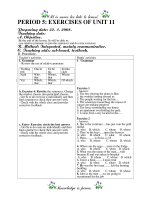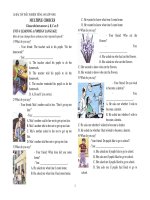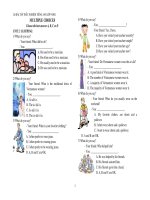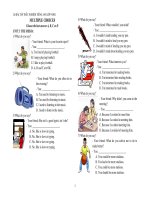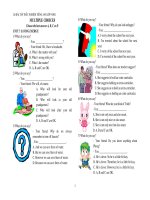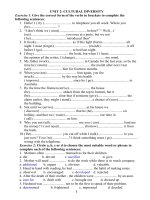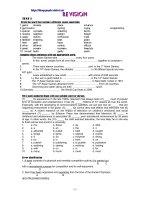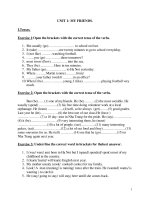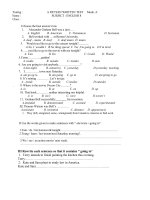Exercises unit 3
Bạn đang xem bản rút gọn của tài liệu. Xem và tải ngay bản đầy đủ của tài liệu tại đây (67.74 KB, 4 trang )
<span class='text_page_counter'>(1)</span>GRAMMAR POINTS A. REFLEXIVE PRONOUNS : (Đại từ phản thân) PERSONAL POSSESSIVE REFLEXIVE PRONOUN PRONOUN (n) (adj) PRONOUN I my mine myself you your yours yourself he his his himself she her hers herself it it its itself we our ours ourselves you your yours yourselves they their theirs themselves Usage : Đại từ phản thân thường được dùng để làm tân ngữ của động từ khi chủ ngữ và tân ngữ cùng là một người hay một vật. E.g. : The children know how to look after themselves He bought himself a new car.. -. Đại từ phản thân còn dùng làm từ nhấn mạnh cho chủ ngữ hoặc tân ngữ, mang ý nghĩa là chính người đó, vật đó. Trong trường hợp này, đại từ phản thân đứng ngay sau từ mà nó được dùng để nhấn mạnh. E.g. : The manager herself spoke to me. I’ll go and see the President himself. Note : Khi nhấn mạnh, đại từ phản thân còn có thể đứng ở cuối câu. E.g. : The manager spoke to me herself. By + reflexive pronoun = alone : một mình E.g. : He lives by himself in a very big house. He lives alone in a very big house. Enjoy + reflexive pronoun = have a good time E.g. : They enjoyed themselves at the beach. They had a good time at the beach.. B. ADJECTIVE CLAUSES : E.g. :. It + be (not) + adj + to-inf. It is easy to find the notice board in the hall.. It is not difficult to learn English.. C. MODALS : (Động từ tình thái) – MUST, HAVE TO, OUGHT TO a. Must : (cần phải, phải) (+) : S + must + verb (bare – inf) (–) : S + must not / mustn’t + V (bare – inf) (?) : Must + S + V (bare – inf) Must dùng để đưa ra một lời khuyên hoặc một lời đề nghị nhấn mạnh. E.g. : You must take more exercise. Join the tennis club. He mustn’t see that film. It’s for adults only. Must dùng để diễn tả sự bắt buộc đến từ phía người nói, bày tỏ cảm xúc, ước muốn của người nói – ví dụ như ra lệnh (cho mình hoặc người khác) E.g. : I must stop smoking. (Tôi phải cai thuốc lá) You must be here before eight tomorrow. (Ngày mai bạn phải có mặt tại đây trước 8 giờ) b. Have to: (phải) (+) : S + have / has to + verb (bare – inf) (–) : S + don’t / doesn’t have to + V (bare – inf) (?) : Do + S + have to + V (bare – inf). Have to chủ yếu được dùng để diễn tả sự bắt buộc đến từ bên ngoài (luật pháp, nội quy, thỏa thuận, lệnh từ người khác) E.g. : You have to wear uniform on duty. (Bạn phải mặc đồng phục khi làm nhiệm vụ) Their parents have gone away. They have to look after the house. Note : Ở thể phủ định, must not và don’t / doesn’t have to hoàn toàn khác nhau : Mustn’t (không được) : diễn tả sự cấm đoán Do (does) not have to (không phải) : diễn tả sự không cần thiết c. Ought to : (nên) chỉ lời khuyên hoặc lời đề nghị. E.g. : You ought to drive more carefully. (Bạn nên lái xe cẩn thận hơn) What time ought I to arrive ? (Tôi nên đến lúc mấy giờ ?). EXERCISES. I.. 1. 2. 3. 4. 5. 6. 7. 8.. II.. Use the correct reflexive pronouns :. Robert made this T-shirt . Liza did the homework . We helped to some cola at the party. Sara, did you write the poem . He cut with a knife while he was peeling the onions. The lion can defend . My mother often talks to in the kitchen. John and Alan, if you want some more milk, help .. 9. I caught sight of in the mirror. 10. The students were so noisy. Even Nancy and Leila were making a lot of noises . 11. Both boys taught to swim. 12. The children are amusing with the small cat. 13. Did you enjoy at the party ? 14. The children are not old enough to dress . 15. The little girl hurt while she was cycling on her bicycle.. Complete these sentences, using a reflexive pronoun and one of the verbs given in the box : cut. enjoy. take care of. turn. help. hide. pay. control. 1. 2. 3. 4. 5. 6. 7. 8.. When peeling the onion, Nam _________________________ badly. The little dog was very frightened. It _______________________ under the bed. I have got some money after the promotion. I can __________________________. The heating ______________________ on at night. Don’t worry about us, Mom. We know how to _________________________________. “Can we have some more cookies”, asked the children to their father. “Sure” the father replied______________________. “Don’t get angry, ____________________________.” Mrs. Hong said to her daughter. The children _____________________________ at the party last night.. 1. 2. 3. 4.. You _______________ tell lies Students ________________________ cheat when they are in examination. A person ______________________ so much money to have a happy life. You as well as your brother _______________________ with matches.. III.. Complete these sentences with “mustn’t, doesn’t / don’t have to” :.
<span class='text_page_counter'>(2)</span> 5. 6. 7. 8. 9. 10. IV. 1. 2. 3. 4. 5. 6. 7.. I’ve already finished my homework, so I ___________________ study late tonight. I ____________________ forget to take my pens and pencils with me. You _____________________ introduce me to her. I’ve already known her. Drivers ____________________ drive very fast in the city center. You __________________ go to the concert if you don’t want to. In order to be a good student, you __________________ be so untidy and lazy. Rewrite these sentences, using adjective clauses : Learning Japanese is difficult. Making friends is not easy. Seeing a detective movie is interesting. Helping other people is necessary. To write that letter is easy. To meet him at the time of the day is difficult. To meet you again after my honeymoon holiday is very pleasant.. 8.. To do all of these exercises in an hour is impossible.. 9.. To swim in the sea in the summer morning is exciting.. PRACTICE EXERCISES I. 1. 2. 3. 4. 5. 6. 7. 8. 9. 10. II. 1. 2. 3. 4. 5. 6. 7. 8. 9. 10. III. 1.. Choose the word whose underlined part is pronounced differently from the others : A. feed B. clean C. sweep D. head A. floor B. four C. room D. door A. sink B. knife C. fire D. rice A. house B. couch C. ought D. counter A. candy B. fry C. many D. happy A. lamp B. pan C. match D. table A. about B. outside C. cousin D. countless A. bread B. steamer C. bead D. meet A. injure B. knife C. picture D. sink A. chemical B. chores C. reach D. match Choose the word which is stressed differently from the others : A. beneath B. scissors C. wardrobe D. coverage A. cooker B. folder C. destroy D. injure A. frying B. towel C. socket D. include A. chemical B. precaution C. electrician D. destruction A. remember B. dangerous C. vegetable D. opposite A. tonight B. dinner C. sorry D. problem A. saucepan B. steamer C. beside D. object A. lighting B. refrigerator C. fixture D. safety A. destroy B. remember C. forget D. injured A. chemical B. medicine C. calendar D. precautionary Choose the best answer : Young children do not understand that many _______________ objects are dangerous. A. home B. house C. homework D. household 2. They put the _____________ on the floor, between the armchair and the couch. A. picture B. shelf C. cushion D. rug 3. The woman _________________ the floor of the office three times a day. A. destroys B. injures C. sweeps D. feeds 4. It’s very easy to find my school. It’s _______________ the ACB Bank. A. under B. opposite C. next D. between 5. The children are old enough to look after ____________________. A. himself B. herself C. themselves D. ourselves 6. Don’t let your children play with that ballpoint pen. It can _________________ him. A. injure B. dust C. destroy D. damage 7. Children may eat drugs because they look like ___________________. A. sweets B. candies C. cakes D. both A and B 8. Everybody ___________________ follow traffic law. A. can B. will C. have to D. must 9. Be careful, the pan is very hot. Don’t _____________________. A. burn yourself B. wash yourself C. dry yourself D. cut yourself 10. It isn’t ______________ to leave the medicines around the house. A. safe B. hard C. dangerous D. interesting 11. Scissors, knives and small objects are __________________ things for children. A. dangerous B. curious C. destructive D. marvelous 12. Did you copy Lan’s answer ? - No, I did it __________________. A. myself B. yourself C. yourselves D. themselves.
<span class='text_page_counter'>(3)</span> 13. ____________________ is a large piece of furniture where you can hang your clothes. A. Refrigerator B Wardrobe C. Desk D. Armchair 14. We __________________ eat much sugar and seasoning powder. A. mustn’t B. can’t C. don’t have to D. oughtn’t to 15. Mother, I can’t do this exercise. _____________________ me ? A. Do you help B. Will you help C. Are you going to help D. Are you helping IV. Choose the word or phrase that needs correcting : 1. I can stay (A) in bed tomorrow morning (B) because I (C) haven’t to go (D) to work. 2. The students ought (A) to learn their (B) lessons (C) careful before (D) the exams. 3. (A) Don’t worry (B) so much. The children can (C) look after (D) themself. 4. You (A) must not let children (B) play in the kitchen (C) because it is a (D) dangerous place. 5. (A) Let’s (B) putting the armchair (C) opposite the couch (D) in the living room. 6. It (A) takes me two hours (B) to do all the (C) household (D) chore every day. 7. Please (A) put the doll (B) on the shelf, (C) among the flower vase (D) and the lamp. 8. You (A) don’t have to (B) drive faster (C) than 60 mph or you (D) might get a ticket. 9. Why (A) do we have to put all (B) dangerous objects (C) out of (D) children’s reach. 10. Do you like (A) working with other people (B) or do you prefer (C) working (D) yourself ? V. Use the correct preposition : in, on, at, after, under, between, beside, among, out of, above, beneath 1. There is a bus station ______________ the end of Hang Buom Street. 2. Keep these medicines ______________ the children’s reach. 3. I lost my keys somewhere _________________ the car and the house. 4. Come _______________ and sit ________________ your sister. 5. D comes ________________ C in the alphabet. 6. The boat sank _______________ the waves. 7. Don’t shelter _______________ the trees when it is raining. 8. Please put the books _______________ the bookshelf _______________ the desk. 9. I often feel very nervous when I am _________________ strangers. 10. Children must attend school _________________ the age of 5 and 16. VI. Use the correct tense or form of the verb in parentheses : 1. Although I have a car, I prefer (travel) _______________by train, especially if I have to (make) ________ a long journey. As the train (travel) ________________ at full speed through the countryside, I can (relax) __________, (drink) ___________ coffee, read a book, or just (look) ____________ out of the window, sometimes the movement of the train (keep) _______________ me asleep, something you couldn’t do while (drive) ________________ a car. The trouble (be) ___________ that I hate (wait) ______________ in cold stations, and I get angry when I have to (waste) ____________ time on (look) _______________ for a taxi or a bus at the (begin) ______________ or the end of my journey. 2. He must (cover) _______________ electrical sockets for safety of the children. 3. The children always try (put) _______________ something in the holes. 4. It only takes one match (cause) __________________ a fire. 5. Most of the children (not enjoy) __________________ reading books today. 6. Her parents let her (go out) ___________________ with her friends every day. 7. (walk) ________________ is a fun, easy and inexpensive activity. 8. Lazlo Biro (invent) _________________ the ballpoint pen in the 19 th century. 9. Telephone me this evening. I _____________________ home. (be) 10. Mr. Hung (teach) ___________________ class 8A5 Literature now. VII. Use the correct form of the word in parentheses : 1. It’s a _________________ (MARVEL) idea for the children to do some cooking at an early age. Generally _____________ (SPEAK), most children can’t wait to be in the kitchen and love getting involved in the ____________________ (PREPARE) of their meals. They should be _______________ (COURAGE) to do so. It’s _________________ (IMPORTANCE) to show them how to do things _________________ (CORRECT) but they should not be criticized too much. Although the finished result may not be quite to your ______________ (LIKE), the young ________________ (COOK) will undoubtedly find it quite the ________________ (TASTE) food he or she has ever eaten. Kitchens can, of course, be _________________ (DANGER) places and so that absolute _______________ (IMPORTANT) of keeping an eye on the children at all times cannot be emphasized too heavily. Sharp knives, for example, should be avoided until the children are old enough to handle them ________________ (SAFE) 2. You must put all chemicals in _____________ cupboard so that children can’t ______________ them. (LOCK) 3. Don’t leave the light on. It wastes ______________________. (ELECTRIC) 4. The ____________________ of atom bomb is very terrible. (DESTROY) 5. The river is very _____________________ for swimmers, especially young children. (DANGER) 6. Those thick clothes seem to be _____________________ for hot weather. (SUIT) 7. Most teenagers like to take part in ______________________ service. (COMMUNUAL) 8. She is always _______________ about the _______________ of her family. (WORRY / SAFE) 9. Mary steamed a fish in a ____________________. (STEAM) 10. Ask an __________________ for advice on how to repair the water pipes. (ELECTRIC) VIII. Read these following passages and choose the best answer : ______________ (1) Precaution for Older Person. You _____________ (2) clean up spills quickly. You should not climb on chairs or furniture. You must have a smoke alarm (3) _________________ each floor and test them (4) ______________ You must take (5) __________ appliances into the bathroom, and never touch electrical appliances (6) ________ wet hands. You must not put plants or a vase of flowers on a television set or other electrical (7)____________ You (8) ____________ smoke in bed..
<span class='text_page_counter'>(4)</span> You must not take other people’s medicine or let others take yours. 1. A. safe B. safer C. safety D. safely 2. A. should B. ought to C. need D. A & B 3. A. in B. at C. on D. to 4. A. monthly B. every month C. months D. A & B 5. A. electrical B. electrically C. electricity D. electrician 6. A. by B. with C. use D. using 7. A. devices B. objects C. appliances D. A & C 8. A. must not B. need not to C. don’t have to D. A & B IX. Read these following passages and decide if the following statements are TRUE or FALSE : In the home, you must keep matches, lighters and candles out of children’s reach. You must have a smoke detector on each floor, and test them monthly. In the kitchen, you must keep sharp knives, scissors, hot meals and drinks out of children’s reach. You must keep the children out of the kitchen during cooking. In the bathroom, you must check the bath water temperature before children get in, and always run the cold water first before adding hot water. In the bedroom, you must keep the furniture away from the windows to make sure children do not climb up and fall out of open windows. 1. The best title of the passage should be “Safety Precautions for Older Persons”. 2. Matches, lighters and candles can cause a fire. 3. It is safe to put furniture near the window. 4. You must check the bath water temperature before children get in. HOA’S BEDROOM This is Hoa’s bedroom. There is a desk on the left of the room. On the desk there are many folders, and above the desk there is a bookshelf. There is a bed near the desk. On the right side of the room, there is a window. There is a wardrobe beside the window. The wardrobe is opposite the desk. 1. The passage is about Hoa’s bedroom. 2. There is a bookshelf beside the desk. 3. The window is on the right of the room. 4. The desk is in front of the wardrobe. X. Fill in each blank of the passages with ONE suitable word :. We moved into our new house (1) ___________ a warm September day. It was not really a new house : it was a hundred and four years (2) _____________, but it was new to us. The house had running (3) ______________, gas and electricity, but for (4) ____________ reason there was no electric light in the kitchen. We had not noticed this shortage (5) ___________ we had first looked over the house. It was something quite unexpected : a house with electricity but (6) ____________ a kitchen light. It was especially puzzling because our (7) ___________ was a large room, perhaps (8) ____________ largest in the house. I telephoned for an (9) ___________ who came and fixed it for us. And he charged £85 for (10) _____________ the job. XI. Rewrite each of these sentences keeping the meaning unchanged : 1. How carefully he drives ! What 2. Driving too fast is dangerous. It 3. We can fix a washing machine without the help of the repairman. We can 4. We climbed the Chau Thoi Mountain in four hours. It took 5. He missed the bus. He got up late. Because 6. Nobody helps her do all of the housework. She does 7. He is lazy, so he can’t get good marks. He isn’t 8. They plan to invite her to come over for dinner tonight. They are going 9. I enjoyed myself at the party last night. I had 10. The children liked to swim in the rain. The children enjoyed.
<span class='text_page_counter'>(5)</span>
